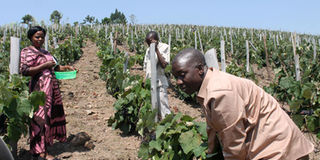Prime
The teacher who fell in love with grapes

Ham Ahimbisibwe (left) explains the agronomy of grapes in his farm. PHOTOS BY RAJAB MUKOMBOZI
What you need to know:
Farmers earn at least Shs3.6m from the crop on an acre of land in a season. A single well-tended plant can yield between 200 and 300 kilogrammes of grapes, writes Rajab Mukombozi.
Hills, hills and hills everywhere you look. Some small, some big, and they all join to form a breath-taking landscape that is Nyakayojo, Mbarara District.
When you visit the area, you must be prepared to traverse the hills.
That saps plenty of energy, but Seeds of Gold team was ready for the exercise as we tracked Ham Ahimbisibwe, the head teacher of Mbarara High School, who manages the vineyard.
After climbing and descending several hills, we met Ahimbisibwe at the farm examining grapes used for making wine.
With him were three farmers, who Ahimbisibwe was teaching how to take care of the wander crop.
“They come here for lessons. Most people in this region keep livestock besides growing bananas, but a good number are now planting grapes because we give them market,” said Ahimbisibwe.
On the 10-acre vineyard, Ahimbisibwe grows both the muscat and camel types of the desert grapes, which also thrive well in semi-arid areas.
Agronomy
To grow grapes, explained Ahimbisibwe, one plants cuttings in a three by three feet hole, in which soil has been mixed with manure.
One then erects wooden posts and puts a wire on them to support the creeping crops. Grapes are harvested twice a year, in April/May and November/December seasons. They were introduced in Mbarara by missionaries in 1960s. According to Ahimbisibwe, the missionaries imported the crops from Kenya, where they were being grown by the Consolata Missionaries.
“A camel normally takes long before it gets thirsty. This crop takes long before it shows signs of withering. Just a little rain is enough since the roots go deep,” says Ahimbisibwe.
They have, however, drilled a borehole to maximise yields and ensure the crop is in good condition throughout the year.
Labour intensive
Growing grapes is quite challenging as the crop is labour-intensive and requires constant monitoring, especially when the grapes are ripening.
“It requires removing suckers, weeding and ensuring the grapes are not eaten by the birds.” Ahimbisibwe’s farm acts as a demonstration centre for farmers.
One hectare under grapes has between 2,000 and 3,000 vines and a good harvest yields between 10 to 15 tonnes of grapes.

Already, 50 farmers in the area have embraced the crop, which Ahimbisibwe says gives better returns than the dominant bananas.
Although he is reluctant to disclose how much the farm is making, he was quick to point out that there is good money in grape farming.
“I do not have figures but on average, a farmer earns at least Shs3.6m from the crop on an acre of land in a season,” he said. A single well-tended plant can yield between 200 and 300 kilogrammes of grapes.
Sales
“The advantage with grapes is that you can plan for them. Unlike the other crops which go to waste in case of glut, when produced in large quantities, grapes can be eaten as fruits or used to make wine,” says Ahimbisibwe.
His hope is to make grapes the main cash crop of the region. “We want farmers to embrace grapes,” said the educationist, who has been managing the farm for about one decades.
Keep clean
Ahimbisibwe says a number of diseases which attack the grapes can be contained by keeping the field clean.
“Do not let the leaves and uprooted weeds lie idle on the farm as they are alternative hosts for pests.”
According to him, the best soils for grapes are loam and volcanic but clay soil is also appropriate so long as it has enough manure.
“The crops should be grown in areas with soils that do not retain a lot of water. One should also ensure they grow the correct variety.”
He added that the berries flourish in temperatures ranging from 0 degrees Celsius up to 40 degrees but are best harvested during hot season.
Challenges
However, one of the major challenges is the downy mildew disease and weevils which can be devastating if not managed.
“Birds are our biggest enemy. We have employed five people who sit in watchtowers to chase them from the farm lest we end up not harvesting anything,” says Ahimbisibwe.
The farmer has plans of investing in a manual wine factory. He wants to make wines such as Sauvignon (white table wine), red wine, sherry and wine used during Mass from the grapes.




